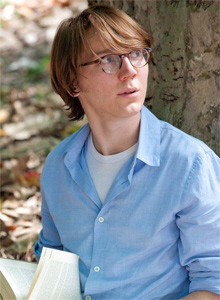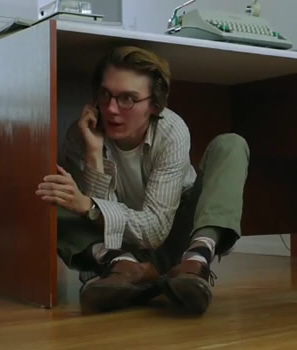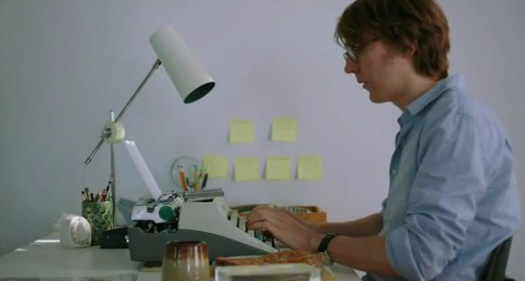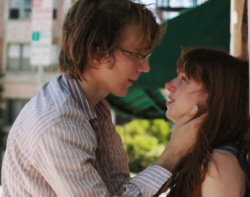 Having first appeared on the scene 11 years ago in L.I.E., you can hardly consider 28-year-old Paul Dano a newcomer. Dano’s work in film’s like Little Miss Sunshine, or his powerhouse performance as the Sunday twins in There Will Be Blood, have only further cemented his status as one of Hollywood’s preeminent up and comers. It’s not everyday one gets the chance to speak with a talent with a long, fruitful career still ahead of them.
Having first appeared on the scene 11 years ago in L.I.E., you can hardly consider 28-year-old Paul Dano a newcomer. Dano’s work in film’s like Little Miss Sunshine, or his powerhouse performance as the Sunday twins in There Will Be Blood, have only further cemented his status as one of Hollywood’s preeminent up and comers. It’s not everyday one gets the chance to speak with a talent with a long, fruitful career still ahead of them.
Driving that point home is the excellent Ruby Sparks, a film written and starring Paul’s girlfriend, the illuminating Zoe Kazan. Dano plays Calvin Weir-Fields, a celebrated author who’s unrelentingly blocked – unable to follow-up his debut classic. He finds inspiration from his new character, Ruby. The more he writes the more he falls in love, and through this love and fixation Calvin has seemingly willed Ruby (and their relationship) into flesh-and-blood existence. It’s not long before Calvin realizes the vast difference in how we perceive our partners, versus who they really are. Ruby being of Calvin’s creation, he works retroactively to fit the ever-changing Ruby into back into his first impression.
What follows is a roundtable CHUD participated in with Mr. Dano. I’ve marked some spoilers below:
Interviewer: Let’s start by talking about the script. You read Zoe’s [Kazan, the screenwriter, she plays the titular Ruby in the film] in its earliest stages. What was your initial reaction?
Paul Dano: I think she wrote probably about three to five pages when I saw it. I think the first thing I said was “Are you writing this for us?” She just sort of said “Yeah.” And I don’t think she was, or knew she was. But I think she was headed there.
It looked like she was in to something interesting, but you know, that’s not a lot of pages. But I’d read plays she’d written and think she’s a very good writer, so I was excited she was writing something.
 Interviewer: Did you offer any input early on? “Where are you taking this?” or “This is what I think?”
Interviewer: Did you offer any input early on? “Where are you taking this?” or “This is what I think?”
PD: Yeah, I would come home and she would have new pages and I would check them out. I’d try to A) be a good boyfriend and be supportive. And then I’d also try to be the best bounce-board that I could and give feedback and ask questions. Just be in conversation with her about it.
Tim Kelly: So once you guys did get on set, what was it like having the screenwriter working with you in such an intimate capacity?
PD: The first day or two I definitely had to lose all self-consciousness and not think about the fact that the writer is there. That they’re her words or that they’re my girlfriend’s words. I definitely had to exorcise any of those thoughts or nerves or anything like that. And then once we got going you’re pretty much there for Calvin (Dano’s character in the film) every day. So you just try to stay focused on that.
TK: Were there ever times when you asked Zoe “Is this something that he (Calvin) would do?”
PD: No. I think when you start preparing for something, you might have conversations with the writer or the director. But that’s hopefully long before you start. The director’s on set giving you notes and this or that. But once you’re there it’s your character. So if I was asking “Would he do this?” That’s probably a bad sign.
Interviewer: Speaking of the directors, you’ve worked with some of the greatest living filmmakers in my opinion. But what I’ve noticed about your career is very rarely do you work with the same director twice. So what brought you back to Valerie Faris and Jonathan Dayton (Little Miss Sunshine)?
PD: A lot of the directors I’ve worked with, I would like to work with again. Ten pages into Zoe writing the script I said “We should send this to Jon and Val.” So even though I had no clue where the story was going it was immediately evident that they would be the perfect people to handle the tone of what she was writing and to collaborate with.
They’re wonderful people, I had a great time working with them the first time. I thought they did a great job with [Little Miss Sunshine] and it’s always a pleasure to work with somebody you also trust one thousand percent. I introduced Zoe to them un-work related, I called them up and said “Hey, you’ve got to meet my girlfriend.” This was years ago. They’re just good, good people… If we could have had anybody direct this film, it was them.

Interviewer: Let’s talk about the use of the word “genius” in the film. I don’t know if you had anything to do with that or if that was more Zoe’s idea, but were either of you drawing on personal experiences of what that word meant to you?
PD: As an actor I certainly was. But I don’t know… you’ll have to ask Zoe because she wrote that. I think it’s really interesting. The idea of having success like Calvin did at a young age and being called a genius and making a lot of money. I think arrested development often happens – and then the pressure to sort of follow that up. People’s expectations of you, what they want from you. Now more people are determining what success is for you.
So I really liked the use of that word. I liked that it was something that really made him cringe. I think that was because of all the pressure he was dealing with. He’s sort of afraid that he’s not going to be able to follow it up. I think he’s afraid of a lot of things in life. That’s why he wants to sort of control things and keep things safe. He’s alone in his house and a lot bad can happen.
Interviewer: Have you felt that kind of pressure in your own career?
PD: I don’t think so. I mean, I’ve felt a lot of pressure for myself – the biggest source of pressure. But no, not to the degree that Calvin did. But it certainly gave me a level of empathy. I can relate to it through myself but also people I know who’ve been in those kinds of positions in our industry. So it’s certainly something I can relate to.
::SPOILER::
TK: You mention “arrested development.” I was wondering your thoughts about the ending. Do you think that Calvin’s in a better place at the end of the film or have they just hit the reset button in some ways?
PD: No, I definitely don’t think it’s the reset button. And I don’t know if they’ll become friends or become lovers at some point. But I think that Calvin is hopefully more open to the person sitting across from him. And more open just to life in general. He’s hopefully more comfortable with himself as well. I think that’s part of the journey of becoming a man. But I also think, sort of how an alcoholic has to have that really bad binge night before they can sober up, I think Calvin had to go to [rock bottom]. Once you hit that first change on the keyboard you have to sort of go to rock bottom before you can reboot. So I do think that that’s what is happening to him and where he’s headed.
TK: Given how long it’s been, she’s not really his creation anymore.
PD: No, I don’t think so. I don’t even think he thought of it as his creation so much as Harry (Calvin’s brother, Chris Messina) proposes. And then when he starts to feel that way, or take that power, that’s when things go wrong.
::END SPOILER::
Interviewer: Would you describe Calvin as a psychopath?
PD: No.
Interviewer: Or psychopathic tendencies?
PD: No.
 Interviewer: Because of the scene where he exerts complete control of her…
Interviewer: Because of the scene where he exerts complete control of her…
PD: I think once you make the mistake of changing her at all, there’s really no other thing to do. To set her free he also must make her not love him, I think. And I think that scene is just as painful for Calvin, I mean it’s really self-destructive and masochistic. He’s destroying the thing that he loves the most and that gave him light in a period where he felt there was not a lot.
I think he was totally genuine when he said he would never change her again, he loved her and she was perfect. I think also, if we didn’t go there we would not really be exploring what control is, then you’re excusing it. I think it’s just human. Again, the best analogy I gave give is how a lot of people have problems where you have to go the worst place before you can become better and change.
To me, in reading it, I felt like it was really human. Again, it’s not a good thing, but yeah.
TK: You went from Being Flynn with De Niro and Paul Weitz this year before moving on to Rian Johnson’s Looper. How satisfying a year has it been professionally, getting to work with some of these heavyweights?
PD: Yeah. I worked with Rian last year, and the movie’s coming out in September. But yeah, absolutely. It’s been great, I feel very fortunate. Definitely working with De Niro and especially, in such a great part and I think he did such a great job. I get to have these meaty scenes with him. It was a gift.
And then doing this film with Zoe, Jon and Val was probably some of the most fun I’ve ever had making a movie.
TK: It shows.
PD: Oh, that’s good. It was definitely one of the most special experiences I’ve had for sure. And then Looper, I have a small part in the film but Rian is going to make some good films. He’s a young guy. So I just wanted to get to work with him for a few days.
~
I couldn’t resist sneaking a Looper question in there somewhere. Many thanks to Paul Dano for taking the time to speak with my fellow colleagues and I. Ruby Sparks is one of the years finest; it opened in limited release on July 25th and will be opening around the country in the coming weeks. I highly suggest checking it out.
Come back tomorrow when we speak with husband and wife directing duo Valerie Faris and Jonathan Dayton, where we discuss why it took six years for them to follow up Little Miss Sunshine.